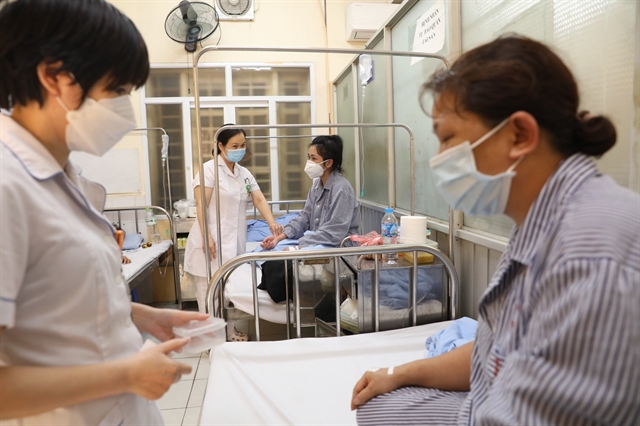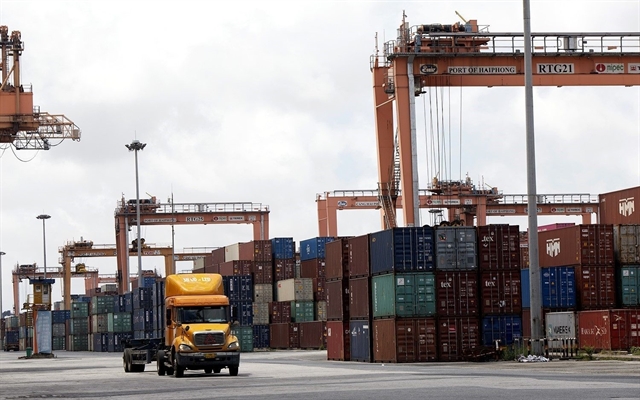 Society
Society

 |
| Patients undergo treatment for dengue fever at Việt Nam - Cuba Friendship Hospital in Hà Nội. — VNA/VNS Photo Minh Quyết |
HÀ NỘI — The capital city reported over 1,300 cases of dengue fever last week, an increase of nine per cent compared to the final week of October.
The Ministry of Health has also announced that there are over 10,000 cases of dengue fever recorded nationwide over the past week, along with two deaths.
Since the beginning of the year, the country has reported a total of 292,439 cases of dengue fever and 112 deaths.
This figure is 4.8 times higher than that of the same period last year, which was 56,240. The number of fatalities also increased by 91.
Hà Nội is seeing the biggest increase in dengue fever cases in the country. The weekly number of infections has risen from 500 to 700 per week in September to 1,200 to 1,400 at the end of October.
The latest report from the capital city’s Centre for Disease Control and Prevention (CDC) said that cases had been recorded across all 30 districts and towns.
Dr Nguyễn Văn Thường, director of Đức Giang General Hospital said that the disease was worse than the previous year, with over 50 per cent of hospitalisations experiencing severe symptoms, including serious abdominal pain, bleeding gums, vomiting blood, and thrombocytopenia.
The hospital is now providing treatment for around 150 dengue fever cases, of which a majority show critical illness.
Đan Phượng District is one of the hotspots of dengue fever with over 1,000 cases recorded in the past week.
Nguyễn Gia Phúc, deputy director of Đan Phượng District Health Centre explained that the situation was caused by dense population and old customs of storing water in uncovered containers, as well as waste problems.
This formed ideal conditions for disease-carrying mosquitos to multiply and cause outbreaks.
Đan Phượng’s health centre had worked with the district People’s Committee to issue guidelines on the control and prevention of dengue fever.
The centre also coordinated with other departments to stay up to date on the situation, in order to issue appropriate measures.
Phúc said: “We also plan to continue communication activities to keep people informed about the situation, in addition to measures to prevent and control dengue fever so that people can actively take action.”
CDC Hà Nội has warned that the number of infections in the city might continue to rise, resulting in more severe cases and fatalities. Forecasts said that the peak of the disease would likely be mid-November.
According to Trần Thị Nhị Hà, director of Hà Nội Health Department, besides the favourable weather for disease-carrying mosquitos, this year is also part of the five-year cycle in which significant dengue outbreaks are recorded.
She added: “There were several undetected or prolonged infection clusters in several districts, which explains the increase in patients.
“In addition, people are still unwary and not seeking professional treatment promptly upon experiencing symptoms.
“Most of them undergo treatment at home, or go to medical facilities late, which leads to severe illness and fatalities.”
In this context, the capital city’s health department has required units in the sector to communicate about the disease and the warning signs, as well as measures to keep their living environment clean and free of mosquitos.
The city also provided training for public and private hospitals on treatment regimens and plans to accommodate patients of different disease severity, allowing for safe hospital transfer if needed.
Hà Nội health department also ordered hospitals to ensure medical supplies and medication, especially those required in dengue fever treatment.
The department director said: “With dengue, the most important measures are to thoroughly clean the living environment, improving outbreak surveillance and early detection of infections and clusters.
“Thereby prompt solutions can be made to prevent widespread among the community.”
She added the active prevention and control of the disease required the engagement of all levels of authorities and the people.
According to health experts, the dengue virus is dangerous as there is no specific medication for the disease. Therefore, addressing symptoms, staying hydrated, taking rest and having an appropriate diet are crucial to recovery. — VNS




